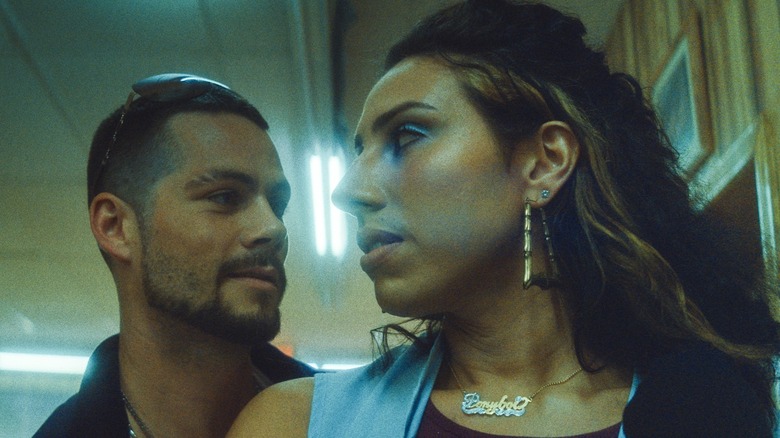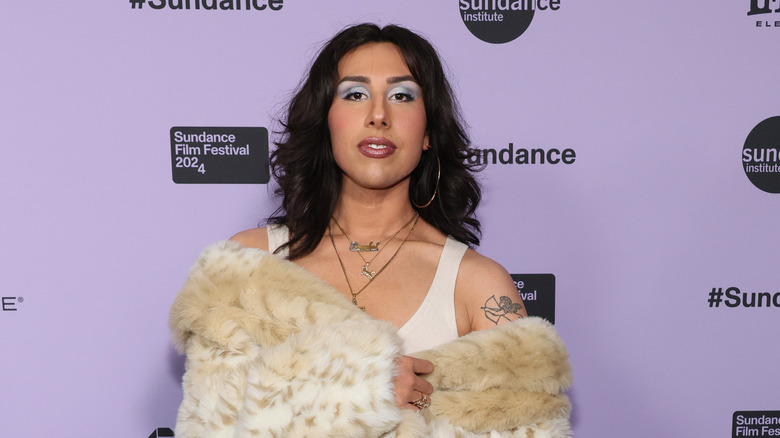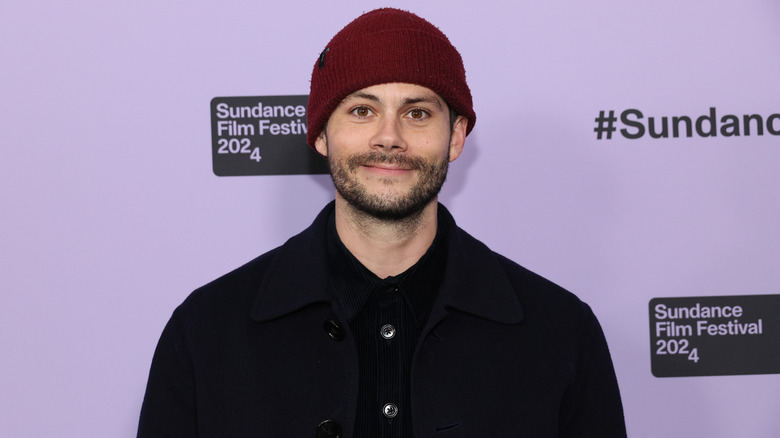Ponyboi Review: A Gung-Ho Gangster Film With A Groundbreaking Hero
- Fascinating, unique protagonist
- Good ensemble of actors
- Strong visual style
- The crime story is on the generic side
There are many things in "Ponyboi," directed by Esteban Arango, that you've seen before in other crime movies: gangsters with thick New Jersey accents, drug deals gone bad, pimps abusing sex workers. What you've almost certainly never seen before in such a film is a character like Ponyboi himself — that is, unless you saw the 2019 short film this feature is adapted from. That short was directed by River Gallo, who wrote the screenplay for the feature adaptation and plays the title character.
Gallo is intersex — their activism for intersex rights was featured in the 2023 documentary "Every Body" — and so is their character in the film. Reportedly, the "Ponyboi" short was the first time an intersex actor ever played an intersex character in a film, and thinking of any realistically depicted intersex characters in media is a challenge. With "Ponyboi," Gallo has taken a familiar genre and enlivened it with a story both groundbreaking and deeply personal. The film Gallo and Arango have made is stylized with elements of camp and melodrama, but there's something authentic at the heart of it, valuable as an act of representation and as entertainment.
My Little Pony: Gender Is Magic
Set in 2002, "Ponyboi" joins what feels like a growing trend of 2000s period pieces like "Saltburn," "Yes, God, Yes," and "Turning Red." There seem to be three reasons for this selection of period: 1) The bus strike going on at the time adds narrative tension in terms of how characters are going to get around (there's a lot of fighting over cars). 2) It's a familiar time when trans and gender-nonconforming issues were less visible and even less understood than they are today. 3) It allows Ponyboi to discuss feeling ostracized as a "My Little Pony" fan assigned male at birth without having to acknowledge the existence of Bronies.
The film takes place on Valentine's Day. At the start, Ponyboi is doing business working a laundromat, having sex, and pushing drugs on behalf of his pimp Vinny (Dylan O'Brien, of "Teen Wolf" and "The Maze Runner" fame); the closest thing he has to a valentine is a friendship bracelet given as a gift from his pregnant BFF Angel (Victoria Pedretti from "You") — who is also Vinny's wife, and whom the closet case Vinny is cheating on with Ponyboi. Angel suspects Ponyboi is going to meet someone special soon, and sure enough, a rugged cowboy named Bruce (Murray Bartlett from "The Last of Us" and "The White Lotus") comes by the laundromat and takes his breath away. Too bad about the mob boss who has literally stopped breathing after taking some of Vinny's latest product, which sends Ponyboi into a panic trying to get away from the scene.
Ponyboi's relationship with gender is a complicated one. River Gallo's performance does an amazing job capturing the ways Ponyboi's gender presentation fluctuates from moment to moment just from the varying intonations of their voice. Though Ponyboi uses "he/him" pronouns, all of his clients call him a girl when they're having sex; he dresses in a stereotypically feminine fashion but takes testosterone to masculinize his body. This choice of hormone confuses everyone he comes across: Vinny would find it easier to market Ponyboi's services if he were a trans woman, and when Ponyboi goes on a quest to stock up on T while on the run, both the professional and "underground" pharmacists try to give him estrogen.
The most interesting scene in the movie occurs between Ponyboi and one of these illegal hormone suppliers, Charlie ("Pose" star Indya Moore). The initial antagonism between the two sheds light on frictions within the LGBTQ+ community that are discussed extensively online but rarely get depicted in the movies (except perhaps at this year's Sundance; fellow U.S. Dramatic Competition entry "Stress Positions" mines similar material for cringe comedy). The conversation progresses into an emotional look at why Ponyboi has made the decisions he's made, how identity is shaped by familial pressures, and how it can change over time. It's a scene you won't find in any other movie, and it's deeply valuable on multiple levels.
New Jersey as a liminal space
In the Q&A following the film's premiere screening, River Gallo described New Jersey as a place with "a liminal relationship with reality." That semi-fantastical sensibility colors Esteban Arango's visual depiction of the state, and I do mean colors it. With a few notable exceptions, almost every scene in "Ponyboi" is bathed in heavy neon colors, lending a heightened and dreamlike quality to the action. Flashbacks to Ponyboi's childhood are depicted in an even more stylized fashion, like something out of a horror movie — which, considering how horrific the medical establishment's non-consensual surgical treatment of intersex children has been, isn't too off from the emotional truth of the matter.
The crime story moves along at a decent pace, and Dylan O'Brien is sleazily compelling (and at times really funny) as the one decently complex antagonist amidst all the typical goombah "Sopranos" extras. Ultimately, though, the genre thrills of "Ponyboi" aren't so much exceptional in their own right as they are merely an effective vehicle for the genuinely unique and emotionally affecting queer character study at the center of it. I don't know when or how the film will be released — it's the first production from Tideline Entertainment, a new studio under the Fox umbrella looking to support diverse voices in cinema — but it's worth checking out when you get the chance.
"Ponyboi" premiered at the Sundance Film Festival on January 20.


